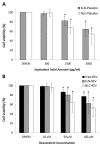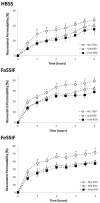Nanoscale Delivery of Resveratrol towards Enhancement of Supplements and Nutraceuticals
- PMID: 26950147
- PMCID: PMC4808861
- DOI: 10.3390/nu8030131
Nanoscale Delivery of Resveratrol towards Enhancement of Supplements and Nutraceuticals
Abstract
Resveratrol was investigated in terms of its stability, biocompatibility and intestinal permeability across Caco-2 cell monolayers in its free form or encapsulated in solid lipid nanoparticles (SLNs) and nanostructured lipid carriers (NLCs). SLNs and NLCs presented a mean diameter between 160 and 190 nm, high negative zeta potential of -30 mV and resveratrol entrapment efficiency of 80%, suggesting they are suitable for resveratrol oral delivery. Nanoencapsulation effectively protected resveratrol from photodegradation, and MTT assays demonstrated that neither resveratrol nor lipid nanoparticles adversely affected cell viability and integrity of Caco-2 cell monolayers. The in vitro intestinal permeability of resveratrol was significantly increased by NLCs, and SLNs did not impair the absorption of resveratrol. Resveratrol oral absorption can be enhanced during meals, since the intestinal permeability was increased in the presence of fed-state intestinal juices. SLNs and NLCs constitute carrier systems for resveratrol oral administration, for further use as supplements or nutraceuticals.
Keywords: biocompatibility; intestinal permeability; lipid nanoparticles; nanodelivery systems; oral bioavailability; resveratrol.
Figures




References
-
- Almeida L., Vaz-da-Silva M., Falcao A., Soares E., Costa R., Loureiro A.I., Fernandes-Lopes C., Rocha J.F., Nunes T., Wright L., et al. Pharmacokinetic and safety profile of trans-resveratrol in a rising multiple-dose study in healthy volunteers. Mol. Nutr. Food Res. 2009;53:S7–S15. doi: 10.1002/mnfr.200800177. - DOI - PubMed
Publication types
MeSH terms
Substances
LinkOut - more resources
Full Text Sources
Other Literature Sources
Medical

